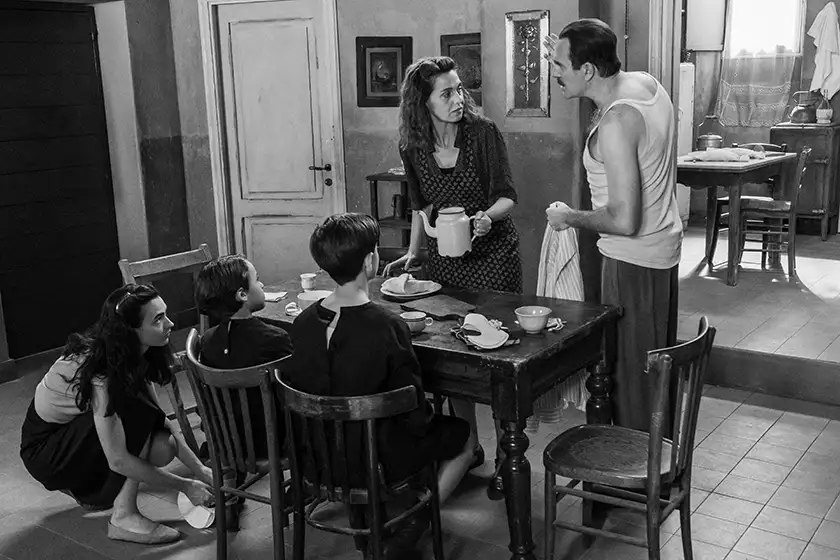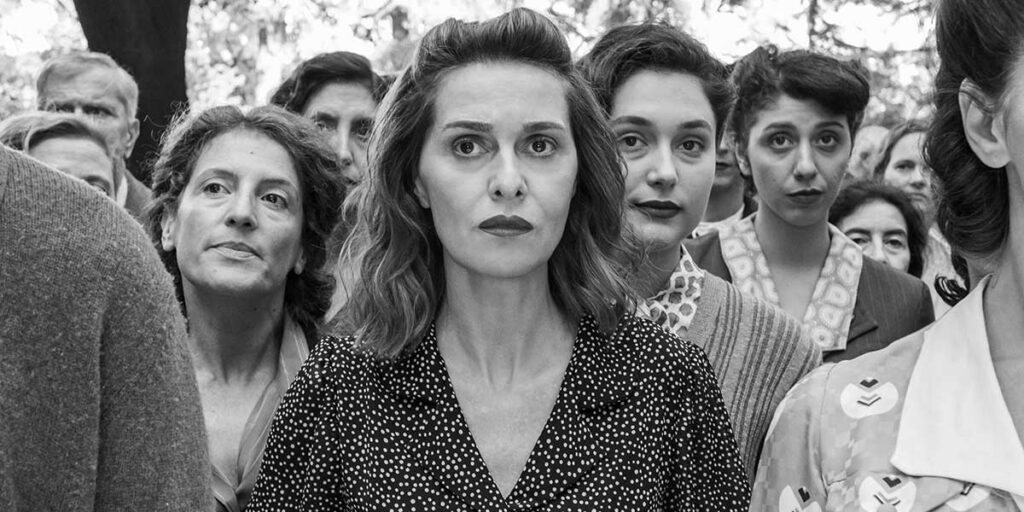In her directorial debut There’s Still Tomorrow (C’è Ancora Domani), Paola Cortellesi manages to speak to generations of Italian women and establishes herself as a strong voice in Italian cinema.
When Barbie and Oppenheimer were released, earlier this year, people all over the world flocked to cinemas, in what became the cinematic event of the year. But another Barbenheimer is taking place right now in Italy, where actress-presenter Paola Cortellesi’s C’è Ancora Domani (There’s Still Tomorrow) is still bringing crowds of Italians to the cinema to this day, two months after the movie’s initial release. In what is astonishingly her directorial debut, writer-director-star Cortellesi (joined by co-writers Giulia Calenda and Furio Andreotti) manages to craft a film that speaks to the very core of a nation, bringing together generations of Italians — and Italian women, in particular — and effortlessly blending neorealism with comedy. It’s a film that shouldn’t work on paper, and yet, somehow, it does.
The influence of neorealism is clear in There’s Still Tomorrow, which opens with a scene that immediately reminded me of Ettore Scola’s A Special Day (Una Giornata Particolare), following its main character, Delia (Cortellesi), in her apartment, as various members of her family chaotically go about their day all around her. Said family members are her husband Ivano (Valerio Mastandrea, of Feeling Better) and their three children: swear word-loving young boys Sergio (Mattia Baldo) and Franchino (Gianmarco Filippini), and daughter Marcella (Romana Maggiora Vergano), whose family’s future resides upon, as it is her duty to find a young wealthy man to marry.
Delia’s role in this patriarchal society is confined to being a mother, cleaning the house, and catering to her husband’s every need. In the house, it falls upon her to care for her misogynistic father-in-law (Giorgio Colangeli’s Sor Ottorino); outside, she works four jobs to earn very little, and all of it goes to her despotic husband. Because Ivano is also a violent man, having learned from a young age a set of rules about men and women’s roles in a society where the latter are required to be quiet and comply, deprived of a right to vote, a right to education, and even a right to say what they think.
Set in 1946, There’s Still Tomorrow follows Delia as she endures the domestic violence and verbal humiliation coming from her husband and father-in-law — and, at times, her children too — while doing all she can to leave her daughter Marisa with a better “tomorrow.” To help her survive are her best friend Marisa (Emanuela Fanelli), a suitor from the past named Nino (Vinicio Marchioni) who dreams of escaping with her, and the kindness of a stranger named William (Yonv Joseph).

Given the subject matter, you’re probably expecting a very serious kind of drama. But despite its neorealist influences (including references to milestones like Rossellini’s Rome, Open City and De Sica’s Bicycle Thieves), There’s Still Tomorrow is still a light, enjoyable watch. Somehow, Cortellesi succeeds at blending neorealism with comedy, in a film that never fails to preserve the director’s strong voice throughout its many tones. The movie opens with Ivano slapping Delia in an exaggerated, comical way, and most of their fights — even the most violent ones — are choreographed like dances, to the sound of lighthearted, anachronistic music, from the opening song, Fiorella Bini’s “Aprite le Finestre” (1956), to Ferruccio Spinetti and Petra Magoni’s “Nessuno” (2004), which accompanies the film’s most violent scenes.
But more songs accompany Delia throughout the film, from Fabio Concato’s “M’innamoro Davvero” to Lucio Dalla’s “La Sera dei Miracoli” and even B.O.B.’s “Outkast” and The Jon Spencer Blues Explosion’s “Calvin.” This helps imbue the film with the exact right dose of humour, and the result is a movie that, at the same time, raises awareness on how patriarchal a society Italy still is to this day, and gives us a heartwarming story, with plenty of lighthearted moments and an incredibly charming central character.
The cinematography (Davide Leone) also helps convey a very specific feeling, imbuing the film with the right dose of nostalgia through gorgeous, grainy black and white. Paola Cortellesi‘s performance is yet another reason why the film works, as she absolutely owns every single scene she’s in, and Valerio Mastandrea is superb as the violent Ivano, who feels more like a victim of society than a one-dimensional villain, which has us even more interested in this family’s dynamics.
Another unique aspect of the film is that it keeps switching from one tone to another throughout, accompanied by Lele Marchitelli’s score, giving us many unexpected moments that still feel coherent with the movie’s overall mood and themes, and help make it such a strong debut. It’s by balancing tones and moods that There’s Still Tomorrow manages to have us smile in delight in one scene and hold onto our seats the next. At some point, I hoped Delia would go all Promising Young Woman on us, and I was shocked when I got something even better; in another scene, Delia and Nino share some food, and their chocolate-stained teeth had me grinning from ear to ear. And then there’s that moment, at the very end of the film, where you’ll find out what There’s Still Tomorrow is actually about, and you’ll be a sobbing mess.
It’s best to leave it at that to avoid spoilers, but There’s Still Tomorrow is a movie you should watch regardless of whether or not you’re Italian, as it deals with universal themes in a unique way and brims with personality. The film opened the Rome Film Festival in October and won two awards there, and the fact that it has already been picked up for distribution in 18 countries (THR) proves it. There’s Still Tomorrow confirms Paola Cortellesi’s talent both in front of and behind the camera, and establishes the filmmaker as a very strong voice in Italian cinema.
After an incredibly successful run in Italian cinemas in October-December 2023, There’s Still Tomorrow (C’è Ancora Domani) was released theatrically in the UK & Ireland on April 26, 2024. The film will be released in US theaters on March 7, 2025.

